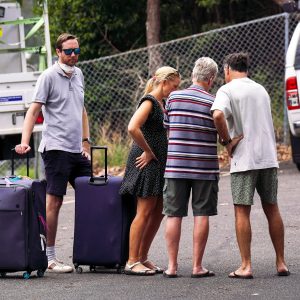Australian academic Fattah faces attacks over Palestinian advocacy
Writer and scholar targeted by media, lobby groups, and officials over her outspoken criticism of Israel’s actions in Gaza
SYDNEY, Australia (MNTV) — Randa Abdel-Fattah, a prominent Australian academic, author, and human rights advocate, is facing a wave of political and media attacks for her vocal criticism of Israel’s military actions in Gaza.
According to the Australian Muslim Times, a coordinated campaign led by Murdoch-owned media outlets, pro-Israel lobby groups, and government officials seeks to discredit and silence Abdel-Fattah, accusing her of anti-Semitism due to her condemnation of Israeli policies.
The backlash has escalated in recent weeks, raising serious concerns about academic freedom and the growing suppression of pro-Palestinian voices in Australia.
Abdel-Fattah, an award-winning writer and researcher, has spent years documenting Islamophobia, racism, and the experiences of Arab and Muslim communities in Australia.
A staunch advocate for Palestinian human rights, she has consistently spoken out against what she describes as Israel’s “genocidal war” in Gaza, calling attention to the large-scale destruction, mass displacement, and loss of civilian lives.
As pressure mounts, the Macquarie University Rank-and-File Committee (RFC) has issued a public statement defending Abdel-Fattah, urging academics and students to push back against what they describe as an attempt to erode academic freedom and suppress dissent.
The RFC has called on the university and the broader academic community to reject political interference in scholarly work.
Despite the attacks, Abdel-Fattah continues to distinguish between Zionism—a political ideology—and Jewish people, arguing that her criticism is directed at the Israeli government’s military actions and policies, not at Judaism or Jewish individuals.
Her supporters argue that accusations of anti-Semitism are being weaponized to delegitimize valid criticism of Israel’s treatment of Palestinians.
The campaign against Abdel-Fattah has also taken a political turn, with Australian Education Minister Jason Clare calling for an investigation into her ARC Future Fellowship—a prestigious research grant awarded through a rigorous peer-reviewed process.
The push for scrutiny is based on allegations that she violated grant conditions by using her platform to advocate for Palestinian rights.
Critics view this as a dangerous precedent, warning that political pressure on independent academic research could lead to wider censorship in Australian universities.
Abdel-Fattah’s case reflects a growing global trend where academics, journalists, and activists who speak out against Israeli policies face professional and institutional retaliation.
The attacks on Abdel-Fattah come amid broader efforts to suppress pro-Palestinian advocacy worldwide. In Australia, universities, media organisations, and public figures have faced increasing pressure to distance themselves from outspoken critics of Israel’s military operations.
Similar patterns have been observed in the U.S. and Europe, where activists and scholars have faced dismissals, funding cuts, and legal threats for their stance on Palestine.
Despite the mounting opposition, Abdel-Fattah remains steadfast in her advocacy, continuing to highlight what she describes as ongoing human rights violations in Gaza.
Supporters argue that the attacks against her are not only an assault on free speech but also an attempt to intimidate others from speaking out against Israel’s actions.
With tensions rising, the case of Dr. Randa Abdel-Fattah has become a flashpoint in the debate over academic freedom, human rights, and the limits of political discourse in Australia.







